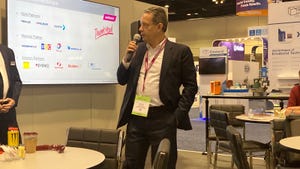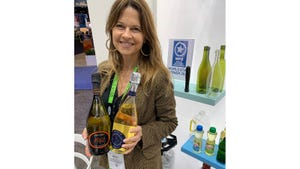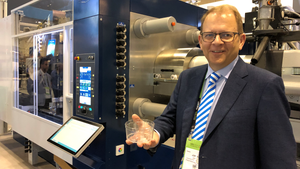HPC planning massive PET recycling plant in California, and more to come
Leon Farahnik is not one to rest on his accomplishments. Just last month he sold PWP Industries—one of the largest thermoformers in the U.S. and also a company he founded and ran—to Pactiv for about $200 million. Over the years he has also run almost every type of processing facility except for rotomolding and, he says honestly, done well by them. For many, now'd be the time to work on that golf handicap.
March 16, 2010
Leon Farahnik is not one to rest on his accomplishments. Just last month he sold PWP Industries—one of the largest thermoformers in the U.S. and also a company he founded and ran—to Pactiv for about $200 million. Over the years he has also run almost every type of processing facility except for rotomolding and, he says honestly, done well by them. For many, now'd be the time to work on that golf handicap.
Farahnik has other plans, he told MPW in an interview in preparation for the magazine's April issue feature article, Notable Processors, on 15 processors making an impact on this industry. Farahnik, who also founded, then sold, then re-acquired and sold Hilex-Poly, North America's largest shopping bag converter, says entrepreneurship runs through his blood.
He already is embarking on his next mission, using his holding company, HPC Industries (Los Angeles, CA), to start a massive 100 million-lb/yr PET recycling facility in California. Planning for the facility began as part of PWP's growth plan, but Farahnik decided to keep the plans for the recycling facility when he sold the thermoformer.
"Recycling of anything, including plastics, will become a major issue.... Carbon footprint also will be more important," he says. Currently much of the post-consumer PET bottles in California is exported to China, which Farahnik considers a ridiculous route for a great material to take. "It's all a matter of pricing," he notes, and reckons he can compete for enough post-consumer PET recyclate to keep his recycling plant fed.
Farahnik does not plan to stop with a single plant, saying, "Within the next six years, I predict I will have three plants of this size across the U.S." He has a non-compete agreement after selling PWP, but keeps all his options open. "I know I'll keep working and I know it will be in plastics," he says.
More on Farahnik and 14 Notable contemporaries in the April issue of MPW. —Matt Defosse
About the Author(s)
You May Also Like


